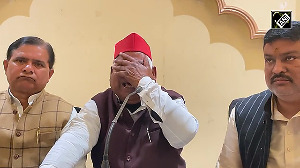Respected as a deft politician, Bhairon Singh Shekhawat enjoyed the enviable reputation of 'Ajatshatru' -- for having friends across the political spectrum in his over five decades-long political career.
The former vice president, who died in Jaipur on Saturday at the age of 87, was undoubtedly among the top three leaders of the Bharatiya Janata Party, along with Atal Bihari Vajpayee and L K Advani, who brought him to the centre-stage as vice president in August 2002 after the BJP-led National Democratic Alliance gained power at the Centre.
Known as 'Bhairon Baba' among his admirers for his immense political skills, he served as the chief minister of Rajasthan thrice and led the opposition for several years in the desert state.
In the course of his long innings, Shekhawat headed the Jan Sangh in the state and served as national vice-president of the BJP.
"Age is no bar for me," Shekhawat had said when he was vice president and had climbed the Eiffel Tower at the age of 83. The remark was significant and gave a clear indication that he would run for the Presidency, the election for which was due in 2007.
When journalists accompanying him to Paris asked him whether he now planned to 'conquer new heights', a euphemism for the Presidential race, Shekhawat had cryptically remarked, "Age is no bar for me." The remark showed his confidence even though the odds were clearly against him. Shekhawat eventually lost the Presidential race to Pratibha Patil.
The 2007 Presidential election eventually became an acrimonious affair with both sides leveling charges and counter-charges, seeking to dig up the past of the rival candidates and their families.
Born on October 23, 1923 in Khachariyawas, a small village in Sikar district, Shekhawat always credited his success to destiny and the 'magic of democracy'. His father's early death forced the school-going Shekhawat, the eldest among eight siblings, to quit studies and join the police service to support the family.
After he had risen to the post of assistant sub-inspector in 1948, Shekhawat decided to quit the police. Four years later, he successfully contested his first assembly election from Danta-Ramgarh constituency in Rajasthan on a Jan Sangh ticket. Starting as a fiery legislator, Shekhawat gradually proved himself to be a formidable opposition leader and an able administrator as chief minister.
Shekhawat was the only member of the Rajasthan assembly to have won in every assembly election since 1952 till he became vice president in 2002, except in 1972 when he lost from Gandhi Nagar in Jaipur. His other major electoral loss was in 1971 when he contested from Barmer in the Lok Sabha polls.
Shekhawat was later elected to the Rajya Sabha from neighbouring Madhya Pradesh in 1974. He enjoyed the distinction of heading three non-Congress governments in the state during 1977-1980, 1990-1992 and 1993-1998. In 1980 and 1992, his governments were dismissed by the Centre before they could complete their tenures. In 1993, despite a thin majority, the BJP government led by Shekhawat managed to complete its term.
His tenure as the chief minister of the desert state was marked by pragmatism as his government launched path-breaking policies. His brainchild -- the Antyodaya scheme to help the poorest of the poor -- brought international accolades for Shekhawat with then World Bank chief Robert McNamara describing him as the Rockfeller of India.
Though he belonged to a part of Rajasthan considered by many as conservative, Shekhawat grew in stature by his personal commitment to progressive ideals. He unequivocally condemned the custom of Sati in the state in the 80s, at a time when few politicians in Rajasthan were willing to speak out against it.
During his chief ministerial stints, Shekhawat took several steps to draw Muslims towards his party. He was the first chief minister to set up a State Waqf Authority. He also got the famous dargah of Khwaja Moinuddin Chisti at Ajmer renovated and established the Rajasthan State Urdu Academy.
"A government is responsible to all sections of its people, not just those who have voted for it," he had said. Shekhawat was also liked by the state bureaucracy, for he never ordered mass transfers whenever he assumed office as chief minister.
An IAS officer, said to be extremely close to outgoing Congress Chief Minister Mohanlal Sukhadia in 1977, was not only retained by Shekhawat in the same position when he took over, but he also became one of his closest aides later. People who knew him closely when he was the chief minister of Rajasthan believed that Shekhawat was a Congressman in the Sangh Parivar's ranks.
Although he was one of the founder members of the Jan Sangh in the state, he did not allow the Rashtriya Swayamsevak Sangh to meddle in the state's affairs. With his perseverance and rustic wisdom, he was able to connect with the masses in a big way. An intense advocate of decentralisation, he had tried to unite non-Congress chief ministers to pressurise the Centre to listen to the woes of the state.
In the 1999 assembly polls, the Congress led by young and dynamic leader Ashok Gehlot in the state, had defeated Shekhawat's BJP-headed coalition government by winning over 153 out of 200 seats. On August 19, 2002 when he was sworn in as vice president, Shekhawat had said he had 'a sense of regret' that he would no longer be in active politics.
"I am treading a different path with which I am not acquainted. But this new road also has its own attractions and challenges," he had said.






 © 2025
© 2025